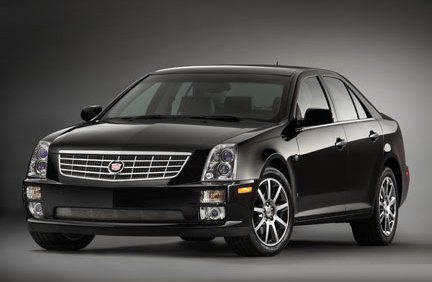GM Plays the Patriotism Card. Again. Still.
From GM’s FastLane Blog: “We’ve been very proud of and grateful for the support and encouragement we’ve received from so many in the business community recently, especially locally here in Michigan. Jim Hiller, CEO of Hiller’s Markets, recently wrote this post on his corporate blog in which he explained why he feels it important to buy from American-based vehicle manufacturers and why he supports his community here in Michigan. We thought Mr. Hiller’s comments were worth sharing.” – Christopher Barger, Director Global Communications Technology” Excerpt:”My epiphany came as I stood on slick-top pavement in a moon-lit night, waiting for my car after a fundraiser for the Juvenile Diabetes Research Foundation. I stood with General Motors Vice-Chairman Bob Lutz, watching foreign car after foreign car drive away into the rain-slicked night. He turned to me as those foreign luxury vehicles peeled out of the parking lot and said, ‘How many people realize that when they buy an American luxury vehicle, they’re providing work for a dozen people for at least a week?’ Before then, I hadn’t felt in my bones the direct connection between the car I drive and the people in my hometown being in, or out, of a job. Many of my friends had told me so, but I didn’t listen – friends from other countries, shaking their heads in disbelief at the thought of neglecting one’s homeland… I don’t even remember what kind of car I was driving, but the next day I bought a Cadillac STS and loved it. All of my preconceived notions that foreign cars were better-made and were longer-lasting, well, they proved untrue.”
More by Robert Farago


































Comments
Join the conversation
Hope you don't have a ton of problems with your xlr-Vmaybe you have great luck. I wasn't talking about drinking oil, the engine has many more problems than that for a "100,000 tune up" engine. From all the stuff I have read and had to live through it looks like they designed it to be thrown away at 100,000 miles. I was using Walmart as an example of an American company that doesn't deserve support not their retail chain, I guess I should have used more of an industrial business since you totally missed my point. About the depression comment I knew I was opening a huge can of worms because most people aren't going to understand and then they get all hostile about it like I am attacking them personnally. The problems are deep in our economic system, I wasn't refering to the things on the surface that always make it look like our economy is hopping and strong. I don't expect you to get what I am talking about, sort of like trying to explain to Rick Wagoner that his corp. culture is flaud and needs to be fixed. You just get the deer in the headlights look, and rebutals that miss the point entirely. You already didn't understand where I was going with the Walmart reference. I'm not talking about the little economic things on the surface that need the reset button to be fixed, reinvented, innovated whatever you want to call it. It's the basis of our economic system, a government that constantly meddles and gets in the way "trying to fix an unsustainable system" and government totally run a muck that needs a major overhaul(can't happen until the denial stops). Maybe you wont get what I'm talking about but I'm sure you will debate what I'm saying and I welcome it. An unsustainable economy kept a float by 70% personal over consumption doesn't get fixed easily by making a bunch of new laws or propping up businesses when there too many powerful people that depend on the imbalance. And especially since most everyone is in denial it's part of the problem. A government that thinks it's job is to stop the natural cyclic correction regardless of future damage or expense and a population that supports such an intervetion no matter how much it's true cost might be. The populace is diseased with short term thinking, lack of accountability and the wrong expecations of government. Things are going to collapse, not because I wished it but because it's inevitable, the ball has already been set in motion. I'm not wishing for a depression, I wish things and the country would change without it, but that doesn't seem to happen unless we have some seriously painful lessons, just human nature I think. The government is going to keep trying to fix things by tossing money at it and in the end making it worse. Look at all the housing market fixes, they want it to start going up right now so we can start spending again and they are going to force it. It needs another 24 months to fix itself with lots of losses but that is not acceptable so they will mess with it some more. What do you think is going to happen when the true correction finally happens. Phil people die everyday. They die in recessions, in booms, you name it. Death is something you can't escape. I don't want people to die and government should be there to stop that at the least but not there to protect me from losing some of my net worth, that is my responsibilty, so is basic survival but there has to be a safety net for the worst situations. THat woul be wat welfare is really meant for not this perverted system we have now. Again our fundamental system and thinking are completely screwed up, and it's happened over decades. I love it now I'm short sighted, hostile and foolish because I'm not hiding behind some fantasy of this country and the world as a whole and bowing down to your rhetoric. Depression is just a word that everyone understand, I'm just saying we need to break everything down to it's foundation, a starting point for rebuilding, it could be called a revolution depending on which side looks at it. I just used depression because that is the word our lame media wil most certainly use for it. I'm looking forward to a rebuilding does that sound better, unfortunately we ned to tear it down to rebuild. I wonder Phil would you have been a Loyalist back in 1776, they didn't want things to change either and were pretty happy to keep the status que. I'm not trying to be condesending, seriously look at your point-of-view compared to their's at the time and tell me where you would have stood. I think you will find that lots of American's right now would probably fall into the Loyalist camp because they can't see any good coming from pain right now to get to something new in the future. I'm going to have to continue this in a few hours I need to head out of town before my wife gets any more angry at me. I'm getting to a point. TO BE CONTINUED
OK I'm finally at the in-laws. This is probably a dead post and wont get read by anyone but I'm only wasting my own time and some bandwidth. We are not going to have a depression. That remains to be seen over the next 12 or more months. Housing is not going to bounce back for a while. And with the recession driving up unemployment it will keep it from bouncing back by feeding a viscious cycle. With easy credit gone and not coming back for a long time there isn't goingot be an easy quick fix to stop it like the government keeps hoping it can do. Managing not to collapse is intrinsic to our systems. We are superbly adaptable as a society and political system, even if the daily particulars can be infuriating and nauseating from time to time. I don’t have any fear for the country’s survival. Of course adversity represents opportunity, and some people get richer in depressions. Nevertheless, as a society we’re vastly better off avoiding one. I don't agree with this. You can't stop the enevitable and a lot of times trying to stop delines makes them worse and last longer. Consumer and government spending has been so unsustainable for such a long time when we are forced to pay for our past and present sins it is going to be really painful, at least economicly. The government is so irrisponsible they keep trying to stop the correction my mortgaging out future. We can't borrow our way to prosperity and then fix the mess we created by more borrowing and shufflng the cards around. The endless avoidance just makes things worse in the long run, driving us to that collapse. I would rather take my lumps and pain now and hit the reset button than keep driving us deeper into this hole. The poorest people suffer disproportionately. Environomental damage increases. Opportunity costs spike exponentially. Sure, there is revival after depression. I hate the fact that that is what come with it, but that is also where some of the lessons will come from. And I would rather have to deal with a mild depression now that corrects thangs than one a 100 times worse later in the future because we avoided deeling with it now. I look forward to fixing it now and accepting it rather than push it of to the future in turn giving us a total catastrophy. I wont keep dwelling on this, since it's a car site. GM is and has been on the mend It's been too little to late and really hasn't even addressed GM's flaud business model. Regardless GM can't be fixed in the time they have left. They lost the American trust with 30 years of bad business and decided to wait until their last dime to start changing(if any change has happened at all, the culture still rules). They need trust to sell their products. It doesn't matter how great you say their products are they have the build trust with those cars and trucks and they just haven't been enough to do that. Wining back the American consumers trust is going to take 10 years or more, about 9 years to long for them. The way I see it they still haven't started down the trust rebuilding road, that wont happen while they still have contempt for the customer. I don't want to prop them up for a decade hoping they figure that out, and it doesn't look like a lot of the buying public wants to either. I was hoping to see them cut up and a new owner(smart and responsible) take some of the parts and reinvent and make it successful. BUT again the government meddled with that and will keep the status quo going, on our dime, without the right kind of changes. And we will keep pouring money into GM's flaud business, slowly destroying what someone else might have been able to make good with, until it is completely burned into the ground and we have nothing left except a lot of jobless people, junk cars and bombed out cities in the midwest, while our kids get the bill. But management will make out like bandits. Again avoidance is not the answer. American Leyland here we come and I really wish we weren't.